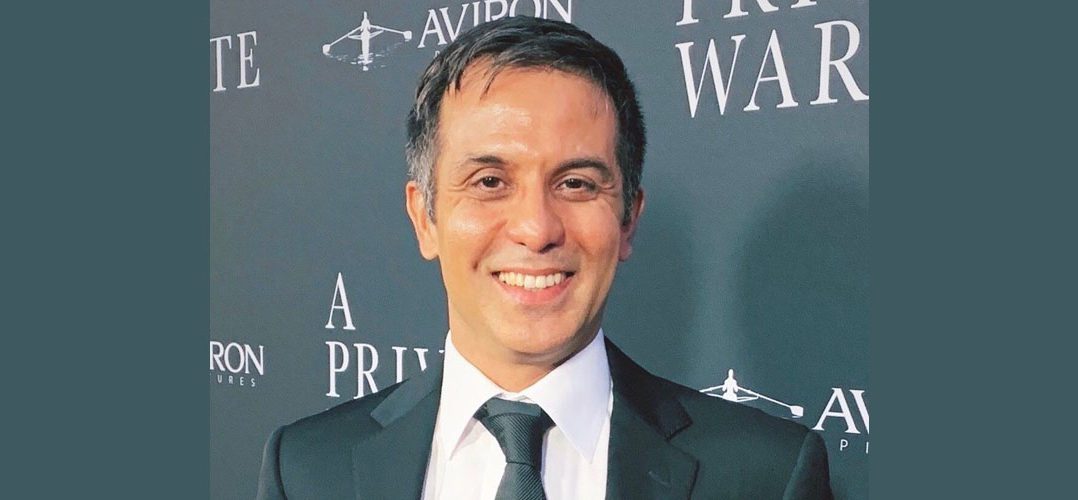Arash Amel is a screenwriter and producer based in Los Angeles. His latest project—A Private War—about female war correspondent Marie Colvin, has just been released theatrically, while Project X-traction (starring Jackie Chan and John Cena) is in post-production. Amel also wrote the story for The Titan—picked up internationally by Netflix and Grace of Monaco, starring Nicole Kidman.
The following is an edited transcript of a conversation Between Arash and Guy Bisson of Ampere Analysis.
>Talk me through getting your latest project (A Private War) off the ground and ‘greenlit’?
There is technically never a point when you are ‘greenlit’ or not. Most independents take the approach that if the opportunity is given to them the green light is always on, because you’re trying to make a movie. And certainly a lot of the companies that work in the international finance space, whether it’s Thunder Road or Automatik…or anyone else, typically you’re moving towards a script and director so that you can package it with cast and then the value of the cast will dictate what budget you are going to get through international financing.
Once you’ve made your budget—and typically you may not make all your budget, but you get close enough to start production while you’re closing up some of the other financing…then you shoot it.
That (is the) financial process of greenlight. And obviously there is a whole creative process of greenlight where you’ve got to make sure the script is right and the director and that all runs in parallel. But there’s one model in the Independent space that I would also acknowledge….where you have a script and very early on you package it with cast and place it with someone who also has distribution. That’s another route you can go. But as a producer you get much more control of different aspects of the movie if you’re going down the international co-production route rather than laying it up at a studio.
>And then the financial model is a traditional revenue share on the distribution, right?
Broadly, yes. It’s quite a complex mechanism and every movie is different but there is typically a waterfall of recoupment, because you also have not only the investors who are primary within the waterfall, but you also have the deferrals that the talent make, the cast make, often the director, the writers make. So it does get very complicated. But broadly that is how recoupment works and it’s also through all the different revenue streams as well so it’s this equation over time through the different windows.
>In the time that you’ve been doing this have the financing opportunities changed?
On one hand financing has become tighter because the gradual collapse of the windows in international markets has tightened foreign sales. That’s definitely been a real trend and noticeable compared to where and how you used to get that financing. What has changed is you see a lot more private investment coming in and investment funds and bankers. That certainly wasn’t the case a few years ago. There is (also) a lot of slate financing money that is coming in for new distributors popping up.
There is a lot of opportunity as traditional studios shrink their output, demand (is growing)…(and) the content needs of the audience are not being met, so someone has to fit that model. There is business opportunity so there a lot of these studios popping up and you will see more of them and they are being backed by funds and banks. That’s how the money is coming in.
>What impact has Netflix had on the market?
Netflix has been a game changer because, as much as the international foreign sales has shrunk, you now have this very hungry global output machine that is in constant need of movies. And it doesn’t matter where you fall on the quality threshold as long as you meet certain requirements and certain needs. So you can make your movie, but as long as you’ve got one eye to Netflix and what their needs are you could actually conceivably create something—however tight the money may be in the international market—and then flip it to Netflix. So while the money has tightened on the international side, the opportunity to get stuff made is increasing, it’s just the sources are different.
>Any cons to working with Netflix?
Typically when you go through traditional distribution—and this is more of a creative bug rather than on the business side—but the only record of you having made this movie is Netflix. It’s on Netflix so there is an intangibility to Netflix and you feel that you make the movie and it takes years and it ends up on the platform where maybe if you do really well for four or five weeks you get positioned on the UI and you are there and you’re being pushed and then you kind of fade. It’s a short sharp flash on Netflix rather than the gradual roll out in the traditional space.
>I’m increasingly seeing Netflix and Amazon and others tying up key writing and producing talent in exclusive first look deals. How does that impact the process of getting projects greenlit?
I agree it’s a trend but I don’t think it’s anything new. All you’re seeing is the top talent just shift their overall deals to Netflix. In television a lot of these deals are exclusive anyway so you’re seeing the shifts like Shonda (Rhimes) and Ryan Murphy, that move is really just (Netflix) outspending the traditional media companies. Obviously there is the creative freedom that goes with it and we are talking big money and that is forcing the traditional companies to step up. So Greg Berlanti and JJ Abrams over at Warner Bros, Warner is going to have to match those deals to keep hold of the talent. So it’s not so much anything new, it’s a new buyer in the market that is forcing the old guard to examine the value they place on their talent and open the cheque books.
>Does the story lead the project or the project lead the story in terms of doing things that make a script or project more likely to get greenlit?
It does go hand in hand. You have to think about both of them. I think, naturally, the stories I gravitate to have luckily been stories that seem to resonate with the zeitgeist, so A Private War—the moment it was presented to me I was like ‘wow, this is a legendary female war correspondent who I’d never seen a movie about, about women correspondents in a war zone’. That was planning the stories five or six years ago. And now here we are in a situation where journalism itself is under attack, so you kind of go with the story and your gut feeling as a creative and you don’t ever expect to be timely but that is something you keep in mind when you are writing the story—how will it resonate—and often it resonates in ways you didn’t expect. But the considerations for the type of material, who you could cast, how the cast will play—that’s huge. That’s part of the entire process. You have to give yourself a fighting chance to get your movie made. The story is always first and you have to honour it, but if there is an opportunity to help the process along to help the producers and the financiers. Because often the difference between a movie getting made and a movie not getting made is we could raise $8m but we need $12m, so if we cast this actor we’ll need $12m but if we cast that actor we can make the budget at $8m…these are all considerations that play further down the line but you also have to allow for those roles to exist so the appropriate cast can be lined up. So it’s hand in hand but it’s an equation you are always thinking of.
>And the process for TV is fundamentally the same?
It’s becoming very similar. A lot of that money coming into movies is also coming into TV and in a bigger way because there are more outlets, more buyers. The hunger for TV right now…we went from ‘Golden Age of TV’ to ‘Peak TV’ and I don’t know what post-Peak TV is because it’s not showing any signs of slowing down and I kind of feel like we called Peak TV too soon. We’ve got a lot more to go. It’s like permanent perpetual immersive TV, because the digital platforms are getting into TV production and that’s bringing studio money from the private independent studios who leverage the foreign market. Examples like Starz and Fremantle and BBC America, they are chasing that market where there are so many networks and the budgets are getting so high that you’re talking $70m or $100m for ten episodes now. Westworld is no longer the outlier at $120m it’s what everyone is chasing and no one entity can finance that alone. So what you are getting is like a studio distributor partnership happening between the studio and the network and they both need each other to compete in this world that Netflix and Amazon and HBO have created.
>What top tips would you give a creative to ensure a project gets greenlit?
When you first come up with an idea always think about the end product….know your destination before you set off on a journey. When I work with young talent I say always have a clear idea of what the poster is going to look like…of how you are going to sell this to the audience. Ultimately, people don’t want to pay $15 to leave their house and go and sit somewhere to watch a movie so you have to convince them—obviously if you are on Netflix you don’t have the same consideration—but even if you want to end up on Netflix, that is a certain type of movie and there is a certain niche so really be aware and educate yourself on what the market is that you are going to be writing into.
Secondly, have no expectation that where you end up is going to be where you expected to end up at the start. So be malleable because not only do circumstances change but the industry changes. So don’t be too rigid in your plan, let it evolve and often it turns out the way it’s meant to.
The last one is very trite, but it’s the think that’s got me through everything: choose your partners wisely and trust them—you’re financing partners, your producers, directors, cast…everyone you work with—you have to spend a lot of time with them and if any one of them proves to be unreliable they will damage you and your brand. And when you’ve done that, let them do their thing, because you can’t do every job and you have to go on trust. Those would be my three tips.
For more tips on winning a commission and getting TV projects off the ground as well as data and insight on the latest global commissioning trends, download the new exclusive report from Ampere Analysis Greenlight: Getting Your TV Project From Page To Market.




